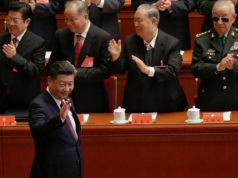BEIJING – All big Chinese companies owned by the central government will be registered as limited liability companies or joint-stock firms by the end of the year, as Beijing moves to make its state-owned giants more nimble, efficient and modern.
About 90 percent of China’s state-owned firms have already completed the process, which has helped improve their governance structures and management, the cabinet said in a statement on its website on Wednesday.
It did not say whether private capital will be allowed to invest in the state giants or whether they will list shares.
Through reforms, the central government hopes to revive China’s bloated and debt-ridden state-owned sector and create “bigger and stronger” conglomerates capable of competing on the global stage.
Part of the reforms will involve shutting the most uncompetitive firms. The ownership structure of some SOEs will also be modernized.
One of the biggest problems facing China, particularly the lumbering state-owned giants, is a spike in debt since the 2008 global financial crisis.
Authorities have stepped up efforts to contain debt risks over the past year, and part of those steps have involved the restructuring of state firms.
Banks won’t support unviable firms
Earlier this year, People’s Bank of China Governor Zhou Xiaochuan said banks will withdraw support for financially unviable firms, repeating pledges by other officials to drive “zombie” firms out of the market.
China is also pushing mixed ownership to allow private capital to invest in firms while retaining the government’s presence in the companies.
The state-owned asset regulator has said “erroneous” notions like “privatization” and “denationalization” should be avoided.
Efforts will be made to strengthen the party’s leadership at big state firms and to prevent the loss of state assets during restructuring, the cabinet said on Wednesday.
The party’s leadership will also help protect employees’ legal rights and ensure the stability of corporate reforms, the cabinet said.
One focus will also be on the formation of the board of directors at state-owned companies, the cabinet said, as part of efforts to bring it in line with current day corporate governance practices.
The board will have say in major corporate decisions, hiring and salary distribution.
Salary corridors linked to corporate profits and productivity will also be set up, according to the cabinet.
Last month, the state asset regulator said China’s centrally administered SOEs will be divided into three types – industrial groups, investment firms and operating companies.
While details were sparse, the move will similarly change the way SOEs are organized.
101 enterprises under central govt
The central government currently owns and administers 101 enterprises in sectors ranging from nuclear technology to medicine.
The SOE reforms come as the Communist Party prepares for a once-in-five-years congress in the fall.
Ahead of the congress, one of the government’s priorities has been to ensure stability in the country’s financial system. Further opening China’s economy and markets is another focus.
China’s securities regulator pledged on Wednesday to expand access to capital markets for all types of investors, while encouraging more long-term institutional participation in the financial domain.










